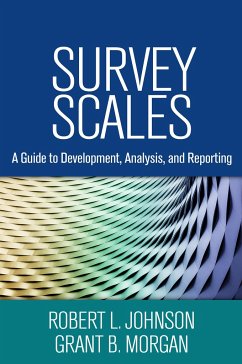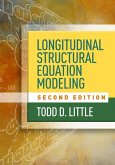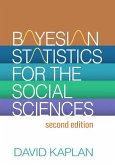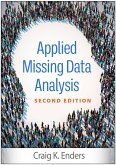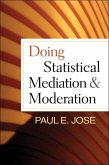- Broschiertes Buch
- Merkliste
- Auf die Merkliste
- Bewerten Bewerten
- Teilen
- Produkt teilen
- Produkterinnerung
- Produkterinnerung
Synthesizing the literature from the survey and measurement fields, this book explains how to develop closed-response survey scales that will accurately capture such constructs as attitudes, beliefs, or behaviors. It provides guidelines to help applied researchers or graduate students review existing scales for possible adoption or adaptation in a study; create their own conceptual framework for a scale; write checklists, true-false variations, and Likert-style items; design response scales; examine validity and reliability; conduct a factor analysis; and document the instrument development…mehr
Andere Kunden interessierten sich auch für
![Statistics Translated Statistics Translated]() Steven R. TerrellStatistics Translated67,99 €
Steven R. TerrellStatistics Translated67,99 €![Longitudinal Structural Equation Modeling Longitudinal Structural Equation Modeling]() Todd D. Little (United States Texas Tech University)Longitudinal Structural Equation Modeling98,99 €
Todd D. Little (United States Texas Tech University)Longitudinal Structural Equation Modeling98,99 €![Bayesian Statistics for the Social Sciences Bayesian Statistics for the Social Sciences]() David Kaplan (United States University of Wisconsinâ Madison)Bayesian Statistics for the Social Sciences80,99 €
David Kaplan (United States University of Wisconsinâ Madison)Bayesian Statistics for the Social Sciences80,99 €![Applied Missing Data Analysis Applied Missing Data Analysis]() Craig K. Enders (United States Arizona State University)Applied Missing Data Analysis93,99 €
Craig K. Enders (United States Arizona State University)Applied Missing Data Analysis93,99 €![Machine Learning for Social and Behavioral Research Machine Learning for Social and Behavioral Research]() Ross JacobucciMachine Learning for Social and Behavioral Research71,99 €
Ross JacobucciMachine Learning for Social and Behavioral Research71,99 €![Doing Statistical Mediation and Moderation Doing Statistical Mediation and Moderation]() Paul E. JoseDoing Statistical Mediation and Moderation67,99 €
Paul E. JoseDoing Statistical Mediation and Moderation67,99 €![An Introduction to Data Analysis Using IBM SPSS An Introduction to Data Analysis Using IBM SPSS]() Lokesh JasraiAn Introduction to Data Analysis Using IBM SPSS46,99 €
Lokesh JasraiAn Introduction to Data Analysis Using IBM SPSS46,99 €-
-
-
Synthesizing the literature from the survey and measurement fields, this book explains how to develop closed-response survey scales that will accurately capture such constructs as attitudes, beliefs, or behaviors. It provides guidelines to help applied researchers or graduate students review existing scales for possible adoption or adaptation in a study; create their own conceptual framework for a scale; write checklists, true-false variations, and Likert-style items; design response scales; examine validity and reliability; conduct a factor analysis; and document the instrument development and its technical quality. Advice is given on constructing tables and graphs to report survey scale results. Concepts and procedures are illustrated with "Not This/But This" examples from multiple disciplines.
Hinweis: Dieser Artikel kann nur an eine deutsche Lieferadresse ausgeliefert werden.
Hinweis: Dieser Artikel kann nur an eine deutsche Lieferadresse ausgeliefert werden.
Produktdetails
- Produktdetails
- Verlag: Guilford Publications
- Seitenzahl: 269
- Erscheinungstermin: 3. August 2016
- Englisch
- Abmessung: 236mm x 167mm x 17mm
- Gewicht: 414g
- ISBN-13: 9781462526963
- ISBN-10: 1462526969
- Artikelnr.: 44474461
- Herstellerkennzeichnung
- Libri GmbH
- Europaallee 1
- 36244 Bad Hersfeld
- gpsr@libri.de
- Verlag: Guilford Publications
- Seitenzahl: 269
- Erscheinungstermin: 3. August 2016
- Englisch
- Abmessung: 236mm x 167mm x 17mm
- Gewicht: 414g
- ISBN-13: 9781462526963
- ISBN-10: 1462526969
- Artikelnr.: 44474461
- Herstellerkennzeichnung
- Libri GmbH
- Europaallee 1
- 36244 Bad Hersfeld
- gpsr@libri.de
Robert L. Johnson, PhD, is Professor in the Department of Educational Studies at the University of South Carolina. His research focuses on the ethics of classroom assessment practices and the scoring of performance assessments in the language arts and the visual and performing arts. He also writes about the teaching of program evaluation and involvement of stakeholders in evaluations. Dr. Johnson's research has been published in such journals as Applied Measurement in Education, Language Assessment Quarterly, Assessing Writing, Teaching and Teacher Education, Assessment and Evaluation in Higher Education, and the American Journal of Evaluation . He teaches courses related to educational research, assessment, survey methodology, and program evaluation. Grant B. Morgan, PhD, is Associate Professor in the Department of Educational Psychology at Baylor University. His primary methodological research focuses on latent variable models, classification, and psychometrics. His research has been published in such journals as Structural Equation Modeling,Computational Statistics and Data Analysis, Psychological Assessment, School Psychology Quarterly, Language Assessment Quarterly, and Quality and Quantity. Dr. Morgan has evaluation experience at the local, state, and federal levels, and has extensive experience developing and using survey scales. He teaches graduate-level courses covering latent variable models, item response theory, psychometric theory, measurement and evaluation, experimental design, and research methods.
1. Scales in Surveys
Introduction
An Overview of the Survey Scale Development Process
Attitudes, Knowledge, and Behaviors
Key Qualities of a Survey Scale: Reliability and Validity
Further Reading
Chapter Exercises
2. Adopting or Adapting an Existing Scale
Introduction
Reviewing Potential Instruments for Adoption or Adaptation
The Mental Measurements Yearbook: A Source for Reviews of Instruments
Plagiarism and Copyright Infringement
Further Reading
Chapter Exercises
3. Establishing a Framework for the Development of a Survey Scale
Introduction
Elements and Format
Functions of the Conceptual Framework in the Development of a Survey Scale
Construction of a Conceptual Framework
Further Reading
Chapter Exercises
4. Item-Writing Guidelines
Introduction
Addressing Relevance
Addressing Audience
Addressing Language
Addressing Item Structure
Addressing Conventions
Guidelines Specific to Item Type
Number of Items
Further Reading
Chapter Exercises
5. Development of Response Scales
Introduction
Length of the Item Response Scale
Numeric and Verbal Response Labels
The Questionable Middle Position
Further Reading
Chapter Exercises
6. Formatting and Reviewing
Introduction
Survey Format and Administration Method
Item Formats Specific to Administration Methods
Complete Reviews and a Pilot of the Survey Scale
Further Reading
Chapter Exercises
7. Analysis of Survey Scale Data
Introduction
Levels of Measurement
Frequencies
Measures of Central Tendency
Measures of Variability
Measures of Association
Obtaining Descriptive Statistics
Further Reading
Chapter Exercises
8. Investigating Scale Quality
Introduction
Field Testing
Response Distributions: Item Quality
Investigating Reliability
Investigating Validity
Further Reading
Chapter Exercises
9. Factor Analysis
Introduction
General Purposes and Processes Associated with Factor-Analytic Procedures
Testing Assumptions
Dimensionality
Extraction: Principal Axis Factoring
Determining the Number of Factors (Model Selection)
Rotation
How to Interpret Factor Solutions
Calculating Factor Scores
Sample Size
Steps after EFA
How to Obtain an EFA Model
Further Reading
Chapter Exercises
10. Documenting the Development of the Survey Scale
Introduction
Determining the Need for a Data Display
Developing Tables
Table Structure
Table Data
Developing Graphs
Structure of a Graph
Organization of Data in a Graph
Narrative about Table or Graph
Concluding Thoughts
Further Reading
Chapter Exercises
Appendix. Analysis of Data: Inferential Statistics
Introduction
Sampling
Inferential Statistics
Inferential Procedures
Nonparametric Inferential Statistics
Further Reading
Appendix Exercises
Sample Solutions to Chapter Exercises
Glossary of Key Terms
References
Author Index
Subject Index
About the Authors
Introduction
An Overview of the Survey Scale Development Process
Attitudes, Knowledge, and Behaviors
Key Qualities of a Survey Scale: Reliability and Validity
Further Reading
Chapter Exercises
2. Adopting or Adapting an Existing Scale
Introduction
Reviewing Potential Instruments for Adoption or Adaptation
The Mental Measurements Yearbook: A Source for Reviews of Instruments
Plagiarism and Copyright Infringement
Further Reading
Chapter Exercises
3. Establishing a Framework for the Development of a Survey Scale
Introduction
Elements and Format
Functions of the Conceptual Framework in the Development of a Survey Scale
Construction of a Conceptual Framework
Further Reading
Chapter Exercises
4. Item-Writing Guidelines
Introduction
Addressing Relevance
Addressing Audience
Addressing Language
Addressing Item Structure
Addressing Conventions
Guidelines Specific to Item Type
Number of Items
Further Reading
Chapter Exercises
5. Development of Response Scales
Introduction
Length of the Item Response Scale
Numeric and Verbal Response Labels
The Questionable Middle Position
Further Reading
Chapter Exercises
6. Formatting and Reviewing
Introduction
Survey Format and Administration Method
Item Formats Specific to Administration Methods
Complete Reviews and a Pilot of the Survey Scale
Further Reading
Chapter Exercises
7. Analysis of Survey Scale Data
Introduction
Levels of Measurement
Frequencies
Measures of Central Tendency
Measures of Variability
Measures of Association
Obtaining Descriptive Statistics
Further Reading
Chapter Exercises
8. Investigating Scale Quality
Introduction
Field Testing
Response Distributions: Item Quality
Investigating Reliability
Investigating Validity
Further Reading
Chapter Exercises
9. Factor Analysis
Introduction
General Purposes and Processes Associated with Factor-Analytic Procedures
Testing Assumptions
Dimensionality
Extraction: Principal Axis Factoring
Determining the Number of Factors (Model Selection)
Rotation
How to Interpret Factor Solutions
Calculating Factor Scores
Sample Size
Steps after EFA
How to Obtain an EFA Model
Further Reading
Chapter Exercises
10. Documenting the Development of the Survey Scale
Introduction
Determining the Need for a Data Display
Developing Tables
Table Structure
Table Data
Developing Graphs
Structure of a Graph
Organization of Data in a Graph
Narrative about Table or Graph
Concluding Thoughts
Further Reading
Chapter Exercises
Appendix. Analysis of Data: Inferential Statistics
Introduction
Sampling
Inferential Statistics
Inferential Procedures
Nonparametric Inferential Statistics
Further Reading
Appendix Exercises
Sample Solutions to Chapter Exercises
Glossary of Key Terms
References
Author Index
Subject Index
About the Authors
1. Scales in Surveys
Introduction
An Overview of the Survey Scale Development Process
Attitudes, Knowledge, and Behaviors
Key Qualities of a Survey Scale: Reliability and Validity
Further Reading
Chapter Exercises
2. Adopting or Adapting an Existing Scale
Introduction
Reviewing Potential Instruments for Adoption or Adaptation
The Mental Measurements Yearbook: A Source for Reviews of Instruments
Plagiarism and Copyright Infringement
Further Reading
Chapter Exercises
3. Establishing a Framework for the Development of a Survey Scale
Introduction
Elements and Format
Functions of the Conceptual Framework in the Development of a Survey Scale
Construction of a Conceptual Framework
Further Reading
Chapter Exercises
4. Item-Writing Guidelines
Introduction
Addressing Relevance
Addressing Audience
Addressing Language
Addressing Item Structure
Addressing Conventions
Guidelines Specific to Item Type
Number of Items
Further Reading
Chapter Exercises
5. Development of Response Scales
Introduction
Length of the Item Response Scale
Numeric and Verbal Response Labels
The Questionable Middle Position
Further Reading
Chapter Exercises
6. Formatting and Reviewing
Introduction
Survey Format and Administration Method
Item Formats Specific to Administration Methods
Complete Reviews and a Pilot of the Survey Scale
Further Reading
Chapter Exercises
7. Analysis of Survey Scale Data
Introduction
Levels of Measurement
Frequencies
Measures of Central Tendency
Measures of Variability
Measures of Association
Obtaining Descriptive Statistics
Further Reading
Chapter Exercises
8. Investigating Scale Quality
Introduction
Field Testing
Response Distributions: Item Quality
Investigating Reliability
Investigating Validity
Further Reading
Chapter Exercises
9. Factor Analysis
Introduction
General Purposes and Processes Associated with Factor-Analytic Procedures
Testing Assumptions
Dimensionality
Extraction: Principal Axis Factoring
Determining the Number of Factors (Model Selection)
Rotation
How to Interpret Factor Solutions
Calculating Factor Scores
Sample Size
Steps after EFA
How to Obtain an EFA Model
Further Reading
Chapter Exercises
10. Documenting the Development of the Survey Scale
Introduction
Determining the Need for a Data Display
Developing Tables
Table Structure
Table Data
Developing Graphs
Structure of a Graph
Organization of Data in a Graph
Narrative about Table or Graph
Concluding Thoughts
Further Reading
Chapter Exercises
Appendix. Analysis of Data: Inferential Statistics
Introduction
Sampling
Inferential Statistics
Inferential Procedures
Nonparametric Inferential Statistics
Further Reading
Appendix Exercises
Sample Solutions to Chapter Exercises
Glossary of Key Terms
References
Author Index
Subject Index
About the Authors
Introduction
An Overview of the Survey Scale Development Process
Attitudes, Knowledge, and Behaviors
Key Qualities of a Survey Scale: Reliability and Validity
Further Reading
Chapter Exercises
2. Adopting or Adapting an Existing Scale
Introduction
Reviewing Potential Instruments for Adoption or Adaptation
The Mental Measurements Yearbook: A Source for Reviews of Instruments
Plagiarism and Copyright Infringement
Further Reading
Chapter Exercises
3. Establishing a Framework for the Development of a Survey Scale
Introduction
Elements and Format
Functions of the Conceptual Framework in the Development of a Survey Scale
Construction of a Conceptual Framework
Further Reading
Chapter Exercises
4. Item-Writing Guidelines
Introduction
Addressing Relevance
Addressing Audience
Addressing Language
Addressing Item Structure
Addressing Conventions
Guidelines Specific to Item Type
Number of Items
Further Reading
Chapter Exercises
5. Development of Response Scales
Introduction
Length of the Item Response Scale
Numeric and Verbal Response Labels
The Questionable Middle Position
Further Reading
Chapter Exercises
6. Formatting and Reviewing
Introduction
Survey Format and Administration Method
Item Formats Specific to Administration Methods
Complete Reviews and a Pilot of the Survey Scale
Further Reading
Chapter Exercises
7. Analysis of Survey Scale Data
Introduction
Levels of Measurement
Frequencies
Measures of Central Tendency
Measures of Variability
Measures of Association
Obtaining Descriptive Statistics
Further Reading
Chapter Exercises
8. Investigating Scale Quality
Introduction
Field Testing
Response Distributions: Item Quality
Investigating Reliability
Investigating Validity
Further Reading
Chapter Exercises
9. Factor Analysis
Introduction
General Purposes and Processes Associated with Factor-Analytic Procedures
Testing Assumptions
Dimensionality
Extraction: Principal Axis Factoring
Determining the Number of Factors (Model Selection)
Rotation
How to Interpret Factor Solutions
Calculating Factor Scores
Sample Size
Steps after EFA
How to Obtain an EFA Model
Further Reading
Chapter Exercises
10. Documenting the Development of the Survey Scale
Introduction
Determining the Need for a Data Display
Developing Tables
Table Structure
Table Data
Developing Graphs
Structure of a Graph
Organization of Data in a Graph
Narrative about Table or Graph
Concluding Thoughts
Further Reading
Chapter Exercises
Appendix. Analysis of Data: Inferential Statistics
Introduction
Sampling
Inferential Statistics
Inferential Procedures
Nonparametric Inferential Statistics
Further Reading
Appendix Exercises
Sample Solutions to Chapter Exercises
Glossary of Key Terms
References
Author Index
Subject Index
About the Authors

